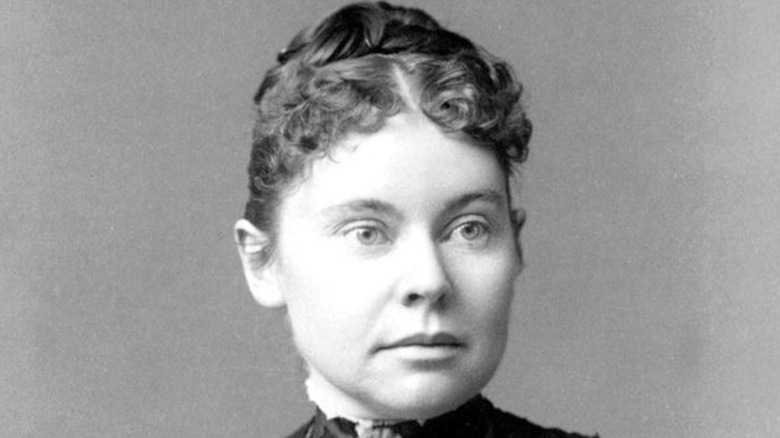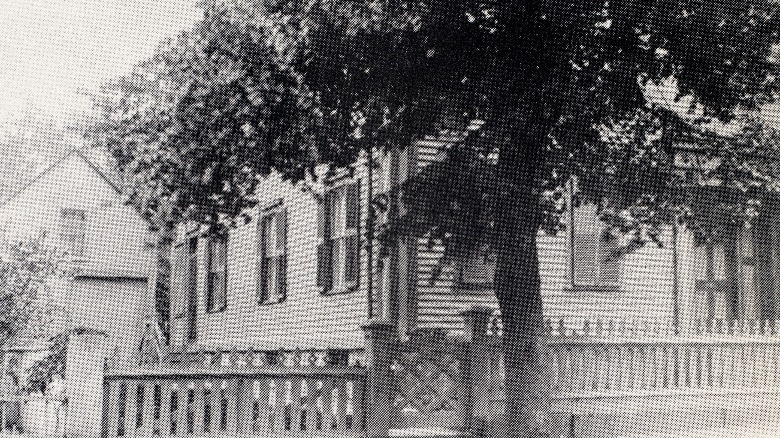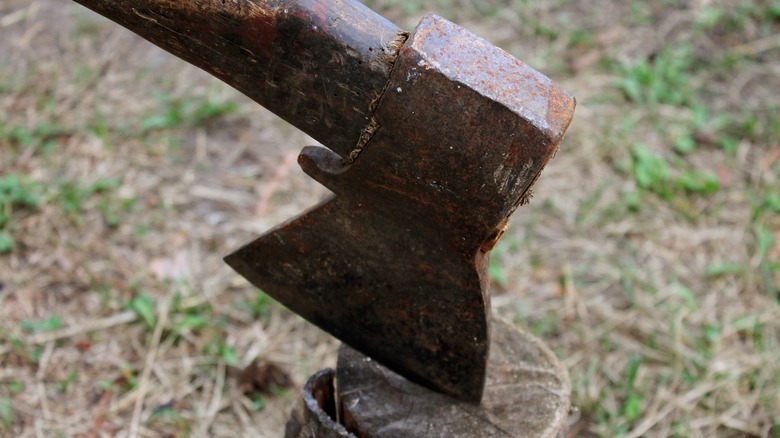Who Were Lizzie Borden's Parents?
Just in case anyone feels like dispelling the relationship between a healthy childhood home and a well-adjusted adulthood, look no further than history's most often-rhymed accused (but acquitted) ax murderess, Lizzie Borden. Borden, who allegedly gave 40 and 41 respective whacks to her stepmother and father, didn't exactly live in the happiest of homes. As History explains, Borden and her older sister Emma "despised" their stepmother, Abby. Their biological mother, Sarah, died when they were young, and their father, Andrew, remarried shortly after. By all accounts, the family tousled over money, particularly "the division of their family's property," as the Crime Museum states. No doubt the situation wasn't helped by Lizzie and Emma never moving out and staying at home in Fall River, Mass., until Emma was in her 40s and Lizzie in her 30s, as Smithsonian Magazine cites.
Come 1892, something must have snapped — or at least it seems that way. Lizzie, a Sunday school teacher and the model of a "quiet, modest, and well-bred" woman, stood trial for taking an ax to Abby and Andrew, the latter of which was left with a face "like raw meat" (per Smithsonian Magazine). The jury acquitted her a year later, and she and Emma moved out of their family home and into the nearby manor, Maplecroft. Lizzie lived there until she died in 1927. She took to her grave the truth of her father's and stepmother's murders and any other family secrets accumulated along the way. That family and its relationships painted a troubling portrait that, in retrospect, was unlikely to end peacefully.
Andrew Borden, successful businessman
Lizzie Borden's family was well-off. Her father, Andrew, was something of a local celebrity in the Fall Rivers, Massachusetts community. As Famous Trials explains, he was an "eight generation high society man" who came from a wealthy line but didn't inherit any of its wealth. His father was a "fish peddler," but Andrew, wanting to go in a different direction, took to carpentry. In a bit of darkly ironic foreshadowing, he worked in the casket business for a while.
Andrew, driven by an intense work ethic, became a tremendously successful businessman. He was the president of a bank, directed "three major cloth mills," owned lots of other property, and could often be seen around town dressed to the nines. Known as "somewhat of a tight-wad," his love of money was equaled only by his frugality. It makes sense that Andrew eventually butted heads with his daughters when divvying up who got what of the family wealth, as Crime Museum describes.
Along the way, Andrew married Sarah Morse in 1845 and had three children, as Genealogy Magazine states: Emma (b. 1851), Alice (b. 1856), and Lizzie (b 1860). Alice died in 1858 at the age of two. There are rumors about shenanigans within the family tree that hint at secret lineages and whatnot, but none of this has ever been confirmed. In the end, some suggest that if not for Andrew's prominent place in his community, the Borden murders wouldn't have gotten nearly the same amount of attention.
Abby Borden died when Lizzie was young
The person who held the most sway over Lizzie Borden's life might have been the person who was in it the least: Her biological mother. We don't know too much about Sarah Borden (maiden name Sarah Morse), who died in 1863 at the age of 39 when Lizzie was only two, as Genealogy Magazine states. Find a Grave explains that she died from a "spinal disease" and "uterine congestion." Uterine congestion is a rare, but extremely dangerous condition that's hard to diagnose. Per Lizzie Borden Warps and Wefts, symptoms included "sharp pains in the abdomen," and the type of "bulging veins" and blood clots associated with thrombosis. In turn, this can result in poor circulation, difficulty walking, and more. Still dangerous today, but treatable, in the mid-1800s doctors typically prescribed laudanum (opium mixed with alcohol) or morphine. Both of these drugs are highly addictive and cause further complications.
Before Sarah died, she and Andrew had decided that they shouldn't have any more children because of the risk involved in giving birth at an older age. They'd also hoped for a son to carry along the family business. So ardent was Andrew's hope that when Lizzie was born, she received his own middle name, "Andrew."
Shared resentment of a step-mother
At this point the Bordens are likely starting to resemble a nigh-archetypal "dysfunctional family." This is especially true because within two years of Sarah Borden's death, Andrew Borden remarried, and his oldest daughter Emma grew to resent it, per Lizzie Borden Warps and Wefts. Emma witnessed her and Lizzie's mother Sarah suffering in a pained, possibly drug-addicted state before she died. Emma was 12 at the time — old enough to remember and pass along her sentiments to her younger sister. And because Emma and Lizzie were so close, even living together for decades as adults, it stands to reason that Lizzie inherited from Emma a certain perspective about their father. This is especially true since Lizzie might have sensed any latent resentment from her father towards her not being born a boy and being able to carry on the family business.
And so, this dense network of embitterment and disquiet came to center on Andrew Borden's new wife, Abby. While it's not necessarily clear what drew Andrew and Abby together, Famous Trials explains that many considered Abby below Andrew's station, so to speak. She was also 37 years old when she and Andrew got married, old enough by far to be considered "an old maid." Emma and Lizzie never liked her, and in fact openly despised her. Lizzie even refused to call Abby "mom" or any other title of affection. She called Abby "Mrs. Borden," per The Crime Wire.
The day of the deed
It took until Emma was 41 and Lizzie 32 for all the latent anger, resentment, and acrimony in the Borden household to come to a head — at least if we assume that Lizzie was indeed Andrew and Abby's murderer. As Smithsonian Magazine explains, Emma was away on vacation on the night of the murder. Lizzie said she was "in the barn" when the murders happened, and that she came across the bodies when she went back to the main house. This explanation, plus Lizzie's pious manner and reputation, was enough for her jury to acquit her.
Abby was killed first, upstairs in a guest room. She'd been hacked 18 times by an ax and left in a twisted and bizarre position, as Famous Trials describes, with a piece of her skull missing. History states that Andrew was downstairs on the couch "in a pool of blood" with his face "nearly split in two" by 10 blows from an ax. Abby was 64 and Andrew 69. Crime Museum states the family grew ill before the murders, and some believe that Lizzie tried to poison everyone. This was a coincidence, however, and was the result of eating contaminated meat. As for the infamous ax, the police never checked it for fingerprints as it wasn't a common method of investigation at the time. Lizzie wound up inheriting "a substantial sum" from her father before moving out of the Borden family home with Emma shortly after.




